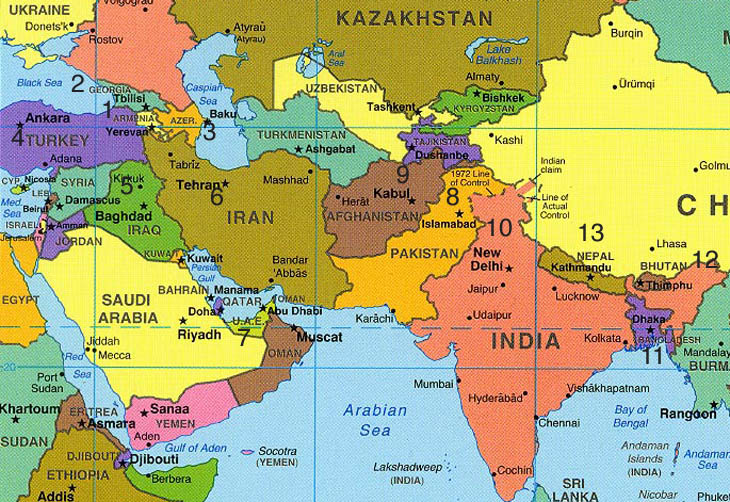Introduction:
The recent escalation of tensions between Israel and Hamas has sent shockwaves across the globe, with repercussions keenly felt in the delicate tapestry of India’s relations with the Middle East. As the region grapples with the fallout of the conflict, India finds itself navigating uncharted diplomatic waters—balancing historic ties and strategic partnerships amid the unfolding crisis. This article delves into the nuances of how the Israel-Hamas conflict is impacting India’s intricate relationships in the Middle East, presenting challenges and opportunities that demand a delicate diplomatic dance from New Delhi.
The eruption of hostilities between Israel and Hamas, sparked by a terror attack from Hamas in the early hours of October 7, 2023, not only sent shockwaves throughout the Middle East but also reverberated globally. The conflict, currently lacking a clear resolution, has ensnared numerous countries in the midst of geopolitical controversies. Within the South Asian region, India’s stance on the conflict is under close scrutiny—not just by Israel, Palestinians, and Gulf nations, but also by its own citizens and countries like the United States (US), with whom its strategic ties are notably strengthening. The timing of the war holds significant importance for India, occurring at a juncture when its Middle Eastern policy has been lauded as one of the success stories in its foreign policy endeavors under the current government.
In recent years, India has adeptly maintained a delicate equilibrium in its relationships with both Arab states and Israel, preventing either party from negatively influencing its ties with regional nations. Additionally, Israel’s burgeoning rapport with key Gulf states has presented an opportunity for India to engage in collaboration on certain mutual interests. However, given the ongoing conflict, India must navigate the situation with utmost diplomacy to prevent any disruption to this positive momentum. The extent to which the Palestinian cause will impact India’s Middle East policy in the upcoming period remains uncertain, especially considering its recent decline in significance.
India’s Evolving Middle East Relations Since 2014: A Strategic Odyssey
India’s Middle Eastern relations have undergone a significant trajectory since 2014 under the leadership of Prime Minister Narendra Modi. Starting in May 2014, the Bharatiya Janata Party (BJP) embarked on a determined effort to enhance India’s bilateral ties, particularly with the Gulf Cooperation Council (GCC) member states, Israel, and Iran. Modi’s approach, often characterized by a focus on bilateral economic relations rather than politico-strategic issues, enabled India to maintain a delicate balance with Middle Eastern countries, irrespective of regional challenges. Notably, India’s comprehensive strategic partnership with the United Arab Emirates (UAE) has strengthened, positioning the UAE as one of its strongest bilateral partners. Simultaneously, India has cultivated robust ties with Israel and maintained cordial relations with Iran.
These relationships have evolved beyond traditional factors such as oil-energy trade and remittances, now encompassing significant growth in economic partnerships, joint investments, strong political ties, increased defense and security cooperation, socio-cultural connectivity, and collaborative ventures in technological sectors, including renewable energy and food security.
Highlighting the economic significance of the Gulf region, India’s third- and fourth-largest trading partners, the UAE and Saudi Arabia, attest to the importance of these ties. Indo-Israeli trade has also surged, reaching USD $10.1 billion (excluding defense) in 2022-2023. Gulf countries, traditionally reliant on oil-based economies, are now exploring non-oil sector opportunities with India, particularly in food security and technology.
The convergence of economic and strategic interests between India, Israel, and the UAE led to the signing of the I2U2 agreement with the United States in October 2021. This quadrilateral initiative focuses on addressing global challenges through investments in water, energy, transportation, space, health, food security, and technology. Subsequent developments include the India-Middle East Food Corridor in 2022 and the India-Middle East-Europe Economic Corridor (IMEEC) launched during the G20 Summit in September 2023. IMEEC aims to enhance economic development by fostering integration between Asia, Europe, and the Middle East.
These developments underscore a paradigm shift in Middle East geopolitics, facilitated by geopolitical realignment and driven by strong convergences of strategic and economic interests, particularly following the Abraham Accords in late 2021. While this warming of ties creates opportunities for India, the ongoing conflict poses challenges, potentially impacting joint collaborative initiatives involving Israel due to apprehensions from Arab states.
Over the past nine years, New Delhi has pursued a de-hyphenated policy regarding Israel and Palestine, treating each relationship on its own merit. Unlike previous Indian governments, which linked Israeli policy with the Palestinian issue, Modi’s administration has sought to maximize the potential of Indo-Israeli cooperation. Modi’s standalone visit to Israel in July 2017 and the removal of “East Jerusalem” from official statements reflected a departure from the previous policy. The evolving stance on Palestine signals India’s intent to treat its relationship with Palestine as distinct from its ties with Israel, contributing to the nuanced dynamics of India’s Middle East policy.

Picture: PM Modi During an Israel Visit in 2017
Ramifications of the Israel-Hamas Conflict on India’s Middle East Relations
The ongoing hostilities between Israel and Hamas have cast a shadow over potential regional collaborations for India in the Middle East, at least in the short term. For Israel, grappling with regional relations, this represents a temporary diplomatic setback, particularly as its political acceptance and diplomatic recognition by key Gulf Cooperation Council (GCC) states were gaining traction. Similar efforts by the U.S. to facilitate normalization between Israel and Saudi Arabia have been put on hold due to growing Arab criticism of Israel’s actions in the Gaza Strip.
India, with its historical ties to Middle Eastern nations and a burgeoning strategic partnership with Israel, faces the challenge of navigating a diplomatic tightrope amid the current Israel-Hamas conflict, with concerns about escalation to other parts of the region. In recent years, India has adeptly managed relations with Israel, the Palestinians, and Arab countries separately, avoiding the impact on individual bilateral ties. The looming question for strategists and experts is whether the Palestinian issue will reemerge as a significant factor in India’s foreign policy towards the Middle East and to what extent it will influence respective ties.
Recent political and diplomatic moves and statements by India suggest a commitment to maintaining de-hyphenated relationships with Israel and Palestine. This implies a growing inclination towards Israel, signaling a gradual decline in traditional support for the Palestinian cause. Notably, India’s voting behavior at international forums concerning resolutions critical of Israel is evolving, with New Delhi frequently choosing to ‘abstain.’ While occasional votes against Israel have not significantly affected overall relations, India maintains a careful balancing act by reiterating support for a two-state solution, providing humanitarian aid to Palestinians, and expressing solidarity with Israel.
Conversely, the recent Hamas attack and evolving security concerns are likely to strengthen counter-terrorism cooperation between India and Israel. Shared security challenges and threat perceptions from non-state actors, such as terrorist and extremist groups, are fostering expanded military-security ties between these countries and other Middle Eastern nations. India has been proactive in highlighting the need for international collaboration against terrorism, condemning terrorism unequivocally, and urging the global community to address this menace.
As the conflict unfolds, the rise in violent activities by Yemen-based Houthi militias in the Red Sea is expected to prompt enhanced maritime security cooperation between India and Gulf countries, including Israel. In the long run, the possibility of a multilateral initiative may be explored to ensure the smooth flow of international maritime trade through the Bab el-Mandeb strait, linking Asia and Europe. The evolving dynamics necessitate a strategic approach by India to maintain individual bilateral relationships while adapting to the changing geopolitical landscape in the Middle East.
Concluding Evaluation: Navigating the Aftermath of the Israel-Hamas Conflict
The ongoing Israel-Hamas conflict has ignited internal discourse in India, a conversation likely to persist, especially with a general election on the horizon this year. However, the substantial impact of this conflict on India’s broader Middle Eastern or Israel policy remains uncertain. Historically, foreign issues have not wielded significant influence over Indian elections. While critics of the BJP or opponents of Modi may deploy the perceived pro-Israel stance as a political tool, pressing the Indian government for stronger support for the Palestinians, such pressures are unlikely to prompt a fundamental shift in New Delhi’s position.
India’s political landscape has transformed since the 1990s and 2000s, with diminished influence from left-leaning political parties critical of India’s ties with Israel. Presently, aside from occasional criticisms during conflicts, there is broad public acceptance of India’s growing relations with Israel and appreciation for the overall strengthening of ties with Gulf countries, home to a substantial Indian expatriate community.
As Middle Eastern nations increasingly adopt a “Look East” policy, India has seized opportunities for new bilateral cooperation in non-traditional security realms such as renewable energy, healthcare, space collaboration, and climate change adaptation. The shift towards diversifying economic sources in these countries suggests a continued interest in building partnerships with India, reciprocated by New Delhi. Despite the current conflict potentially slowing down joint collaborations involving Israel and other Arab countries, there is room for bilateral ties to prosper.
While there may be a temporary deceleration in joint ventures, India’s foreign policy towards the Middle East is unlikely to undergo a massive transformation due to the ongoing conflict. As India has historically maintained a balancing act in its policy towards the Israel-Palestine conflict, an immediate and drastic shift is not anticipated. Nevertheless, it would be prudent for India to contemplate a more comprehensive, Middle East-centric strategy, moving beyond transactional bilateral cooperation and addressing the region’s complexities in a holistic manner.
Reference – Geopoliticalmonitor.com




